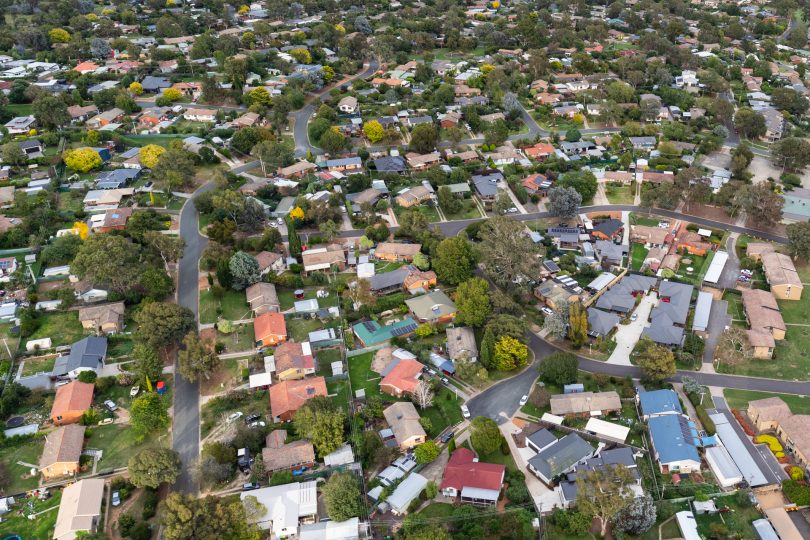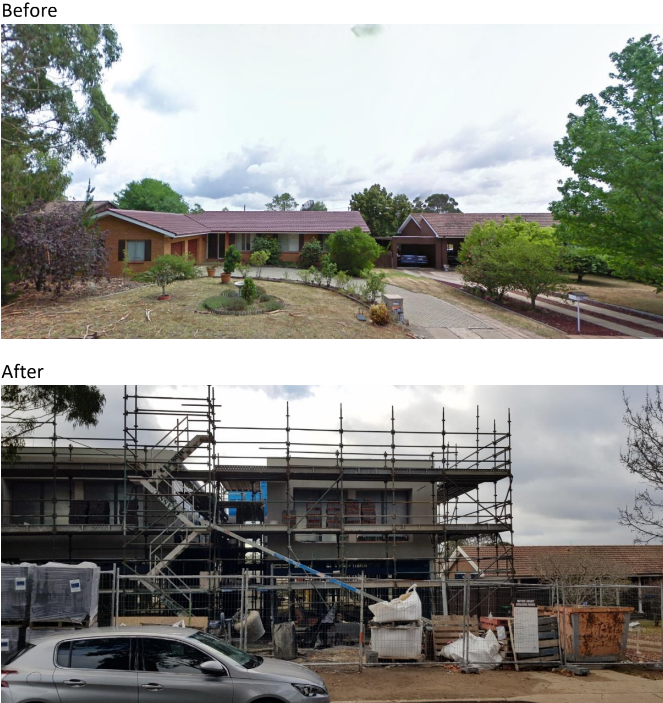
Leafy Canberra from the air. What will it look like in 10 years? Photo: Michelle Kroll.
The ACT Government has a problem with its long awaited planning bill.
Underwhelming, unclear and unresponsive is the damning reception from community groups.
The pro-housing lobby Greater Canberra believes the bill doesn’t go far enough and projects will still be held up in ACAT, while the city’s seven community councils, which also include residents’ groups, feel frozen out, so little of their submissions have actually been adopted.
The government-funded community councils have been accused of being unrepresentative with a reputation for opposing development of any kind, particularly in the inner suburbs.
Indeed, part of the Government’s big consultation push in recent years has been directed at engaging a broader audience instead of the so-called squeaky wheels.
But the councils and residents groups are open for anyone to become involved, their members are unpaid and part-time, and much of the time they are the only check on poor development, given the way the acknowledged by all sides “broken” planning system operates.
So when after all this time the consensus among these diverse communities is that the Government hasn’t listened and that they are no closer to understanding just what an outcomes based planning system means or what will determine a Territory priority project, then there should be red flags about just where the Government is leading us.
One complaint is that the Government is putting the cart before the horse by finalising legislation before the new Territory plan and new district strategies can be looked at, so Canberrans can see how the whole package of planning reforms will work together.

Approved, but is it appropriate in residential Torrens. Photo: Supplied.
There also is a concentration of power in the Chief Minister, Minister and the Chief Planner, with the Legislative Assembly sidelined.
The fear is that MLAs will have little say in how the ACT’s greatest asset, land, will be managed.
While the need for new housing of all kinds in the ACT is unquestioned, where, what and how remains contentious.
When the Government talks about a more streamlined system, many who have been in the planning trenches over the years worry Canberra’s green suburbs will fall like dominos to densification.
They want to know how the planning bill’s objects relating to climate change, resilience and sustainability will be carried through into the Territory plan and the district strategies to ensure Canberra suburbs remain liveable.
Exemptions for development applications include knockdown-rebuilds, which can result in maxed-out blocks particularly if there are dual or triple occupancies that invoke the magic word adaptable, reducing open space requirements.
In Woden, the concern is that the horse has bolted with the current system delivering inappropriate building heights of 28 storeys on the edge of the town square, the key open space area in the town centre.
In Gungahlin, fears remain that it will be a dormitory without a business and employment base.
And that the new planning system is about to change things.
There were calls to keep the pre-DA consultation process and fix it but the Government has ignored these.
The community councils remain deeply pessimistic about a new planning system and the minister who will deliver it, as well as feeling that the ACT’s political system is largely unresponsive.
Another concern is that the ACT public service is still too siloed and uncommunicative, and does not have the capacity to deliver good planning outcomes.
Does the Environment, Planning and Sustainable Development Directorate actually have the skills to assess, guide and ensure good development?
We too often hear that agencies do not talk to each other, or incredulous responses to some approvals that wouldn’t pass any kind of pub test.
Admittedly, the Government has to balance a wide range of interests and demands but it seems like it is set on a course and isn’t about to be deterred.
Residents and business deserve certainty but there are still too many questions surrounding the road to a new planning system.
The Government could resolve some of them by taking a more wholistic approach by giving the community all of the pieces to the planning jigsaw so it can see the full picture.
It must engender more confidence in the process or the final outcome will fall far short of what Canberra deserves.





















